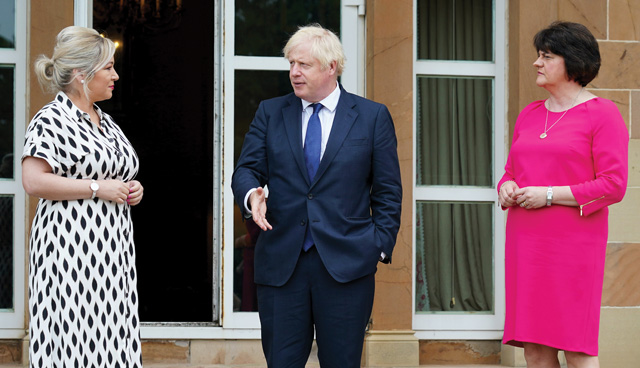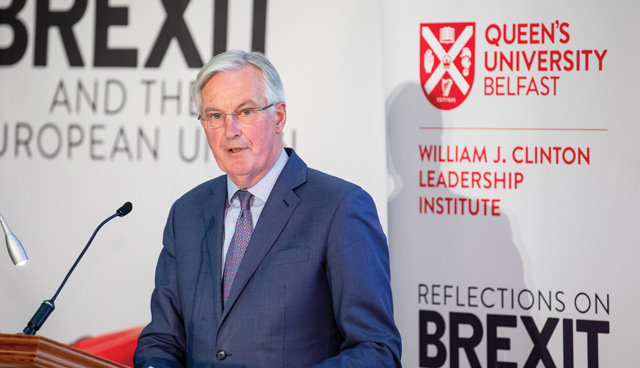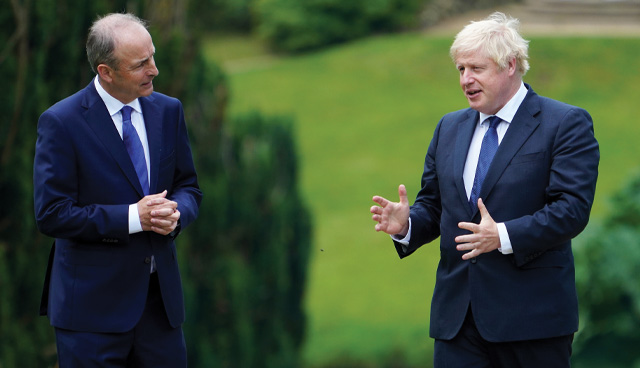Brexit: Hard border a reality once more

As the UK seeks to wriggle out of the Withdrawal Agreement it signed with the EU in October 2019, EU leaders have warned that the future trading relationship is in jeopardy.
European Commission President Ursula von der Leyen sternly stated that the 2019 Withdrawal Agreement, which included the Protocol on Northern Ireland, was “an obligation under international law and prerequisite for any future partnership”.
The President was responding to revelations in the Financial Times that the UK was preparing to side-step key obligations in the Agreement through the publication of an Internal Market Bill.
The EU appear to have been blindsided by the UK Government’s bold move and have mobilised quickly to stress the threat of the ongoing trade negotiations being derailed. The Protocol, which committed to Northern Ireland continuing to follow EU rules on customs, VAT, state aid and goods standards, appeared to solve the potential need for a hard border in Ireland, however, if the deal is undermined, it’s not unthinkable that one would be required to protect the EU’s single market.
The EU’s Chief Negotiator Michel Barnier warned that “everything that has been signed in the past must be respected; it is what underpins confidence going forward”.
The UK Government has targeted two specific areas, included in the revised Protocol on Northern Ireland, which it has objections against. The first is that the Protocol outlines that EU law on state aid will apply to the UK in relation to the goods trade in Northern Ireland, meaning that the UK must notify Brussels of any state aid decisions.
The second is the requirement for Northern Ireland businesses to complete export summary declarations when sending goods to Great Britain. On both of these, Brexiteers argue that the reclaimed sovereignty promised by Brexit will not be realised.
In response, the UK is expected to include much more narrowly defined clauses on the obligation to notify on state aid and ensure Northern Ireland’s businesses will not be required to file export summary declarations when sending goods to Great Britain.
The UK’s Chief Negotiator, David Frost, gave an indication of the mindset of the UK’s team recently when he stated that the UK would not become a “client state” of the EU by agreeing to “level playing field” clauses.

It would represent a shocking act of bad faith that would critically undermine the Good Friday Agreement political framework and peace process and the UK’s ability to secure other crucial deals to protect the Northern Ireland economy.
The UK’s move is set to make any progress on the latest round of talks, which started on 8 September, unlikely. The talks follow an unfruitful negotiation period in mid-August, which were described as a “backward” step in the hopes of having a deal in place by 2020.
Following those talks, Barnier spoke of his disappointment and surprise at the lack of progress during discussions believing that the UK failed to bring forward solutions on areas of key interest to Europe.
“Too often this week it felt as if we were going backwards more than forwards,” said Barnier following the negotiations. “I simply do not understand why we are wasting valuable time.”
Barnier stressed that at this stage, an agreement between the UK and the EU seems “unlikely”.
The August negotiations included two of the recognised areas of greatest contention, namely, post-Brexit competition and fishing rights. Also included were law enforcement and judicial co-operation, trade in goods and services, transport and the UK’s future participation in EU programmes.
Both sides have previously stated their willingness to have a deal completed before October, allowing time for ratification prior to the ending of the transition period on 31 December. An extension of the transition period looked plausible following the outbreak of the pandemic but an EU-UK Joint Committee on implementing the Withdrawal Agreement was told in June that the UK will not seek an extension of the transition, despite many aspects of implementation of measures within the Withdrawal Act still to be agreed, including the Protocol on Ireland and Northern Ireland.
The UK has already stated that it will not be ready to implement full post-border controls on goods entering from the EU until July 2021, instead setting out plans for a new three stage customs regime, starting 1 January 2021.
Frost, the UK’s Chief Negotiator, accused the EU of being “unnecessarily difficult” and the UK has taken issue with the EU’s persistence that an agreement on fishing and state aid must be reached prior to any engagement on other areas.
“The EU is still insisting not only that we must accept continuity with EU state aid and fisheries policy, but also that this must be agreed before any further substantive work can be done in any other area of the negotiation, including on legal texts,” Frost outlined.
“This makes it unnecessarily difficult to make progress. There are other significant areas which remain to be resolved and, even where there is a broad understanding between negotiators, there is a lot of detail to work through. Time is short for both sides.”
Stand off
The evident stand off between the EU and the UK prior to September’s talks has led some to believe that the UK’s Internal Market Bill is an effort to scare the EU into granting greater concessions to the UK requests.
However, others are of the belief that Prime Minister Johnson, who had to woo hard line Brexiteers in his party to support the Withdrawal Agreement Bill’s passage through Parliament at the beginning of this year, has swung back to believing that the UK can prosper in a no deal scenario.
Johnson may have already indicated as much recently when he stated that a deal had to be done by the time of the European Council on 15 October, otherwise “we should both accept that and move on”.
Three scenarios appear plausible. Firstly, that the threat to tear up the Withdrawal Agreement is in fact a sign that the UK are desperate for a deal, hoping that pressure will be applied to Barnier to soften on the UK’s demands on state aid and fishing. Secondly, that the UK has decided to go the no deal route but wants Brussels, rather than Downing Street, to pull the plug. Thirdly, that the Government is placating hard Brexiteers following poor handling of the health and economic crises.
Worth noting though is the fact that Barnier, in light of the revelations, did not cancel his visit to the UK for talks.
Downing Street has denied that it is set to renege on the agreement made with the EU last year but has admitted that it is considering “fall back options” should a trade agreement not be reached and described the Internal Market Bill as a standby plan.

Johnson told French President Emmanuel Macron that the changes were “limited” and technical, and that he stood fully behind the commitments made last year.
That plan would reportedly give UK ministers powers to determine themselves whether Brussels needed to be notified of state aid decisions.
Such an approach poses a range of challenges for the UK. Firstly, in the middle of a deep economic recession, taking a leap in to the dark by bittering future relations with the EU and hoping for trade deals with other potential partners will not be viewed lightly, especially if it’s seen to be economically detrimental. Secondly, the UK’s actions could undermine any hopes of success in those future deals with negotiators unlikely to look favourably on the overwriting of a ratified international deal.
Northern Ireland
The re-emergence of a potential hard border on the island of Ireland comes just weeks after the DUP First Minister, whose party helped block a similar looking proposal put forward by former Prime Minister Theresa May in the House of Commons, said that she had to recognise that a border in the Irish Sea “is the reality now”. Foster, while restating her opposition to the Protocol, said that her role was now to mitigate against the damage to the union.
The statement came as a shock, especially to some in her own party, who maintain their opposition to the Withdrawal Agreement. Senior MP Sammy Wilson and the party’s Brexit spokesperson recently described the Protocol as a “betrayal of this part of the United Kingdom” and said that his party did not accept the deal.
With many in the DUP expected to support the UK’s shift in position, pending the release of the terms of any Bill put forward, Foster will be potentially embarrassed by the timing of her statement.
Ulster Unionist Party Leader Steve Aiken has also welcomed the opportunity to reconsider elements of the protocol on state aid rules and market access, however, the majority of Northern Ireland’s political parties have warned the UK Government not to renege on the Brexit deal.
The leaders of four pro-EU Stormont parties, namely the Greens, Sinn Féin, the SDLP and the Alliance Party penned a joint letter to the UK Government which stated that while the protocol was “imperfect”, it guarded against a hard border on the island of Ireland. The letter urged the Government to “honour its commitments” to ensure the Protocol was implemented “rigorously”.
“The economic and political impact on the island of Ireland, on the UK and above all on the people whom we represent would be devastating, and long-lasting,” it read.
“It would represent a shocking act of bad faith that would critically undermine the Good Friday Agreement political framework and peace process and the UK’s ability to secure other crucial deals to protect the Northern Ireland economy.”
Separately, the deputy First Minister Michelle O’Neill said the move would be a “treacherous betrayal”, while the SDLP Leader Colum Eastwood believes it would threaten peace. Justice Minister and Alliance Leader Naomi Long said it would make any country think twice about doing deals with the UK.
The news was also met with pessimism south of the border where Foreign Affairs Minister Simon Coveney, fresh from opting not to put his name forward to replace Phil Hogan as EU Trade Commissioner, branded the UK’s approach as “unwise”.





